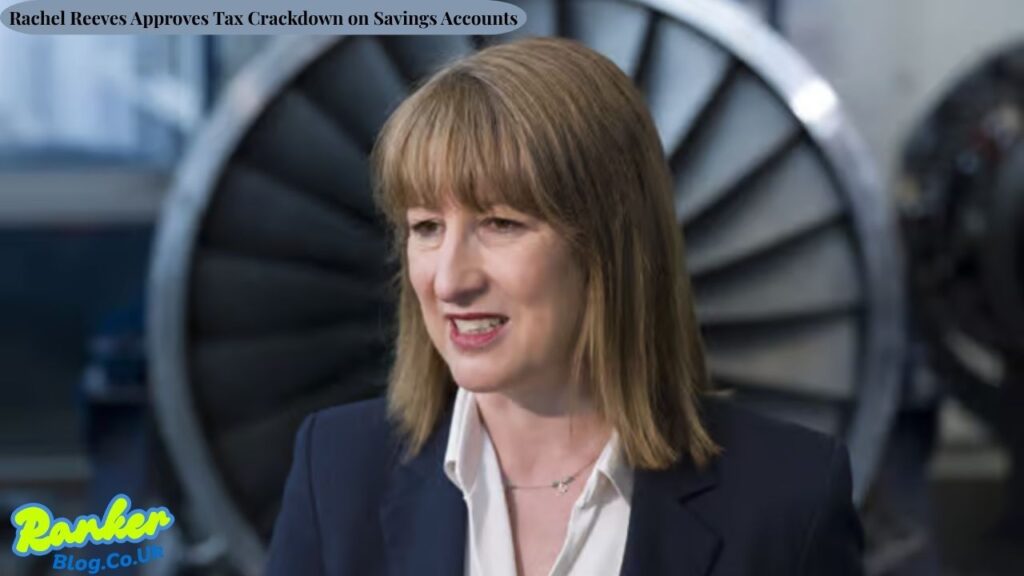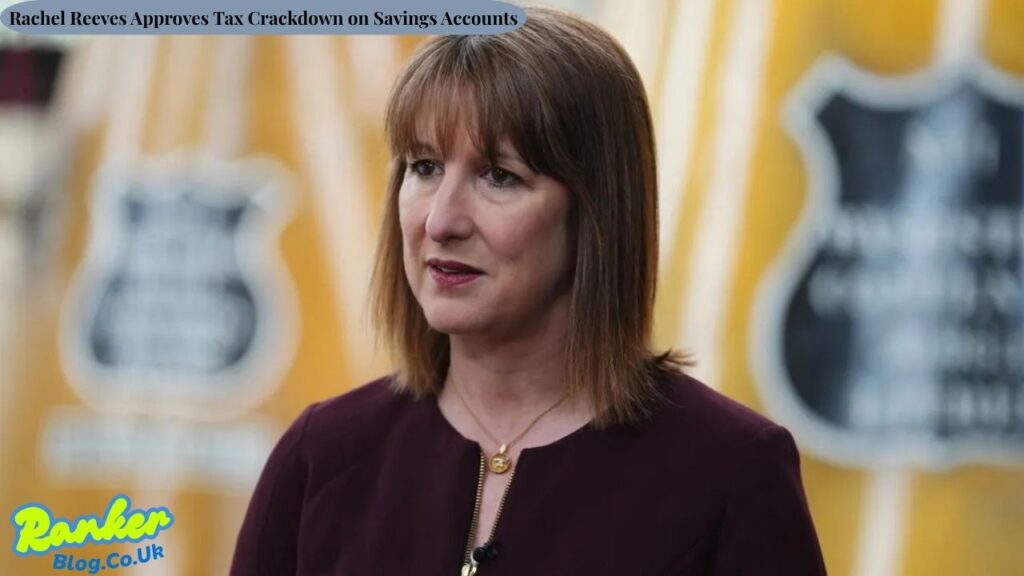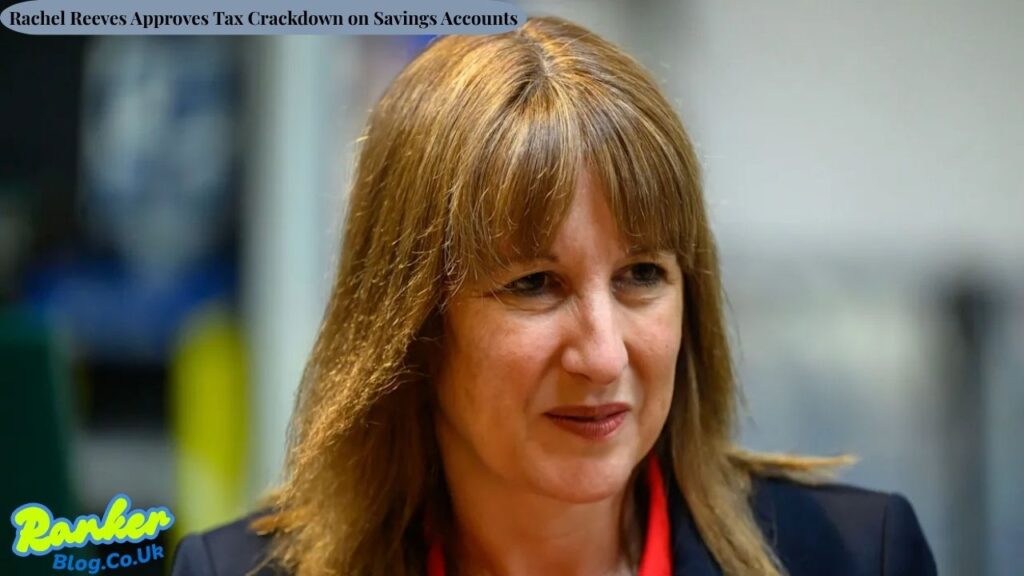Introduction
The financial landscape for UK savers has shifted dramatically as Rachel Reeves, serving as Chancellor of the Exchequer, has approved a significant tax crackdown on savings accounts. This decision marks a pivotal moment in British fiscal policy, affecting millions of people who rely on their savings to build financial security.
Rachel Reeves made this announcement as part of broader economic reforms aimed at addressing the nation’s fiscal challenges. The tax crackdown on savings accounts represents one of the most substantial changes to personal finance regulations in recent years, and its implications will be felt across households throughout the country.
For everyday savers, this development signals a need to reassess their financial strategies. The significance of this policy extends beyond simple numbers on a tax form—it touches the very heart of how British families save, plan, and prepare for their futures.
Background and Context

Current Savings Account Taxation in the UK
Understanding the current taxation system helps contextualize why Rachel Reeves felt compelled to approve this tax crackdown. Traditionally, savings accounts have enjoyed certain tax protections, allowing people to earn interest on their deposits without immediately facing tax obligations on every pound gained.
The existing framework operates through a tiered system where different income brackets receive varying levels of tax relief. This structure was designed to encourage saving while still generating revenue for public services.
Personal Savings Allowance Explained
The Personal Savings Allowance (PSA) has been a cornerstone of UK savings policy for years. Basic-rate taxpayers currently benefit from a £1,000 tax-free allowance on savings interest, while higher-rate taxpayers receive £500. Additional-rate taxpayers don’t receive a PSA at all.
This allowance system meant that many savers could accumulate interest without worrying about tax implications, particularly when interest rates were historically low. However, the landscape has changed considerably in recent times.
Rising Interest Rates and Impact on Savings Income
The dramatic increase in interest rates over recent years has transformed savings accounts from modest earners into potentially significant income sources. What once generated £50 or £100 annually in interest now produces several hundred or even thousands of pounds for those with substantial savings.
This surge in savings income has pushed many previously untaxed savers over their PSA thresholds, creating a situation where more people owe tax on their interest earnings than ever before. The government has taken notice of this trend, which directly influenced Rachel Reeves’s decision to approve the tax crackdown.
Government’s Fiscal Pressures and Revenue Needs
The UK faces considerable fiscal pressures, from funding healthcare services to supporting infrastructure development. Against this backdrop, Rachel Reeves and her team have been searching for revenue sources that can help balance the books without placing undue burden on working families.
Savings accounts, particularly those generating substantial interest in the current high-rate environment, represent a potential revenue stream that the government believes can contribute to national finances.
Details of the Tax Crackdown

Specific Measures Approved by Rachel Reeves
The tax crackdown encompasses several key measures that will reshape how interest on savings accounts is treated. While specific details continue to emerge, the core of Rachel Reeves’s approved policy involves adjustments to existing allowances and the introduction of new reporting requirements for financial institutions.
One significant change involves the reduction of tax-free thresholds for certain savers, particularly those in higher income brackets. The crackdown also introduces stricter monitoring of interest earned across multiple accounts, closing loopholes that some savers may have used to minimize their tax exposure.
Changes to Tax-Free Savings Thresholds or Allowances
Under the approved tax crackdown, the Personal Savings Allowance may see adjustments that affect how much interest savers can earn before facing tax obligations. Rachel Reeves has indicated that these changes aim to ensure fairness while still encouraging saving behavior among British households.
The modifications could involve either reducing the PSA amounts or changing the income thresholds at which different allowance levels apply. Some analysts suggest the crackdown might also affect how joint accounts are taxed, though official confirmation remains pending.
Timeline for Implementation
The implementation timeline for this tax crackdown remains a critical concern for savers trying to plan their finances. According to government sources, the initial phases could begin within the current fiscal year, with complete implementation expected over the following twelve to eighteen months.
Rachel Reeves has emphasized a phased approach to give both savers and financial institutions adequate time to adjust their systems and strategies. Early warning systems will alert affected savers about their changing tax obligations well before any penalties apply.
Which Types of Accounts Are Affected
The tax crackdown on savings accounts doesn’t uniformly affect all savings vehicles. Traditional savings accounts, high-yield savings accounts, and certain fixed-term deposits fall squarely within the policy’s scope. However, Individual Savings Accounts (ISAs) maintain their tax-advantaged status, as Rachel Reeves has confirmed that the crackdown doesn’t extend to these protected savings vehicles.
Money market accounts, notice accounts, and regular savings accounts all face scrutiny under the new rules. The distinction between different account types becomes crucial for savers looking to optimize their tax position.
Estimated Revenue Generation for the Treasury
Treasury estimates suggest this tax crackdown could generate several hundred million pounds annually once fully implemented. Rachel Reeves has defended this revenue projection as necessary for funding essential public services without raising income tax or National Insurance rates.
The actual revenue generated will depend on how savers respond to the policy changes and whether they shift funds into tax-advantaged vehicles or adjust their savings behavior in other ways.
Rationale Behind the Decision

Government’s Economic Objectives
Rachel Reeves’s approval of this tax crackdown aligns with broader government economic objectives centered on fiscal responsibility and sustainable public finance management. The policy reflects a philosophy that those benefiting from higher interest rates should contribute proportionally to the national coffers.
The government argues that the crackdown creates a more equitable system where savings income is treated more similarly to other forms of income, reducing perceived unfairness in the tax code.
Budget Deficit Reduction Goals
Reducing the budget deficit stands as a central priority for the current government. The tax crackdown on savings accounts represents one tool among many that Rachel Reeves is deploying to narrow the gap between government spending and revenue.
By tapping into the increased interest income generated in today’s higher-rate environment, the Treasury believes it can make meaningful progress toward deficit reduction without implementing more politically contentious measures.
Addressing Public Service Funding Needs
Public services across the UK face funding challenges that require creative revenue solutions. Rachel Reeves has framed the tax crackdown as a necessary step to ensure adequate resources for healthcare, education, and social services.
The additional revenue from savings accounts taxation will be directed toward these priority areas, the government contends, making the policy not just about revenue generation but about supporting the services that British families depend upon daily.
Response to Increased Savings Interest in High-Rate Environment
The dramatic shift in interest rates has created an unprecedented situation where savings accounts generate substantial income for millions of people. Rachel Reeves recognized that the existing tax framework, designed for a low-interest-rate environment, no longer reflects the current economic reality.
The crackdown responds to this mismatch by updating tax policy to align with the new normal of higher returns on savings accounts, ensuring that tax rules keep pace with economic conditions.
Impact on Savers
Who Will Be Most Affected
The tax crackdown will disproportionately impact middle and upper-middle-income savers who maintain substantial balances in savings accounts. Those with £20,000 or more in savings earning competitive interest rates may find themselves facing new or increased tax obligations.
Retirees relying on savings interest to supplement their pensions represent another significantly affected group. These individuals often keep larger sums in accessible savings accounts for security and liquidity purposes, making them prime candidates for increased tax exposure under Rachel Reeves’s approved policy.
Higher-rate taxpayers face the most immediate impact, as their already-limited Personal Savings Allowance makes them vulnerable to tax obligations even on modest interest earnings.
Examples of Tax Liability Changes
Consider a basic-rate taxpayer with £30,000 in a savings account earning 5% interest annually. Previously, they would earn £1,500 in interest, with the first £1,000 covered by their PSA and only £500 subject to 20% tax, resulting in a £100 tax bill.
Under the potential changes from this tax crackdown, if the PSA were reduced to £500, the same saver would face tax on £1,000 of interest, doubling their tax liability to £200. For higher-rate taxpayers, the numbers become even more significant.
Comparison: Before vs. After the Crackdown
Before Rachel Reeves approved the tax crackdown, many savers enjoyed substantial tax-free interest income thanks to generous allowances and lower account balances that kept them under thresholds. The combination of low interest rates and adequate PSA protection meant minimal tax obligations for most people.
After the crackdown’s implementation, the landscape shifts considerably. Savers will need to track their interest earnings more carefully, potentially face quarterly tax payments, and consider restructuring their savings across different account types to minimize tax exposure.
Impact on Different Savings Vehicles
While traditional savings accounts bear the brunt of this tax crackdown, the policy creates ripple effects across the savings ecosystem. Fixed-rate bonds, which lock money away for set periods in exchange for higher interest rates, may become less attractive if the tax advantage diminishes.
ISAs, conversely, may see renewed popularity as savers seek to shelter their money from the new tax provisions. Rachel Reeves has acknowledged that some shift toward ISAs is expected and even welcomed, as these vehicles encourage long-term saving behavior.
Reactions and Responses
Public Response from Savers
Public reaction to Rachel Reeves’s approval of this tax crackdown has been mixed, with frustration and concern dominating early responses. Many savers express feeling penalized for being financially responsible, arguing that taxing savings interest discourages the very behavior the government should encourage.
Social media platforms and financial forums buzz with discussions about strategies to minimize impact, with savers sharing tips and expressing solidarity in facing these new challenges together.
Banking Industry Reaction
Banks and building societies have responded cautiously to the tax crackdown, recognizing both challenges and opportunities. Financial institutions must update their systems to accommodate new reporting requirements, incurring costs that they may pass along to customers through fees or reduced interest rates.
However, some banks see opportunity in marketing ISAs and other tax-advantaged products more aggressively, potentially capturing customers looking to restructure their savings in response to Rachel Reeves’s policy changes.
Opposition Party Criticism
Political opposition has seized on the tax crackdown as evidence of misplaced priorities. Critics argue that targeting savers—often middle-class families trying to build financial security—represents poor policy that will harm rather than help the economy.
Opposition MPs have called for amendments to Rachel Reeves’s approved measures, suggesting alternative revenue sources that wouldn’t penalize responsible saving behavior. Parliamentary debates on the issue have grown heated, reflecting the policy’s controversial nature.
Financial Experts’ Analysis
Financial advisors and analysts offer nuanced perspectives on the tax crackdown. Some acknowledge the fiscal logic behind Rachel Reeves’s decision, noting that high interest rates have created windfalls for savers that perhaps warrant taxation comparable to other income forms.
Others warn of unintended consequences, including reduced saving rates, increased risk-taking as people seek tax-advantaged returns elsewhere, and potential economic slowdown if consumer spending patterns shift dramatically in response to reduced disposable income from taxed savings.
Consumer Advocacy Groups’ Statements
Consumer protection organizations have expressed concerns about the tax crackdown’s impact on vulnerable savers. Groups representing retirees, in particular, worry that fixed-income individuals relying on savings interest will face disproportionate harm from Rachel Reeves’s policy.
These organizations call for exemptions or special provisions for pensioners and others living on fixed incomes, arguing that the crackdown should distinguish between wealthy investors and ordinary people trying to make their money work for them in retirement.
Broader Implications
Effect on Savings Behavior and Culture
Rachel Reeves’s approval of this tax crackdown may fundamentally alter British savings culture. If keeping money in savings accounts becomes less advantageous due to taxation, people might reduce their emergency fund targets or shift toward riskier investments seeking better after-tax returns.
The psychological impact shouldn’t be underestimated—generations have been encouraged to “save for a rainy day,” and policies that seemingly penalize this behavior could erode that cultural norm over time.
Impact on Financial Planning Strategies
Financial planners now face the challenge of incorporating this tax crackdown into their client recommendations. Strategies that made sense just months ago may require a complete overhaul to account for the new tax landscape Rachel Reeves has created.
Diversification becomes even more critical, with advisors likely recommending spreading money across various account types, including ISAs, premium bonds, and potentially even light equity exposure for clients who previously stayed entirely in cash savings.
Potential Influence on Investment Decisions
The tax crackdown could inadvertently push conservative savers toward investment markets they previously avoided. If savings accounts lose their tax efficiency, stocks, bonds, and investment funds might become comparatively more attractive despite their higher risk profiles.
This shift could benefit markets in the short term but raises concerns about inexperienced investors entering volatile markets without a proper understanding, potentially leading to financial losses that offset any tax savings achieved.
Comparison with Other Countries’ Savings Taxation
International context reveals that the UK’s approach, even after Rachel Reeves’s crackdown, remains relatively moderate compared to some European nations. Countries like Germany and France have different systems for taxing savings, some more generous, others more restrictive.
However, comparisons prove complex because overall tax burdens, social service provision, and economic contexts differ dramatically. The crackdown positions the UK somewhere in the middle of international norms, neither particularly generous nor exceptionally harsh toward savers.
Alternatives and Recommendations
Tax-Efficient Savings Options Still Available
Despite the tax crackdown, savers retain access to several tax-efficient vehicles. ISAs remain fully protected from the policy changes Rachel Reeves approved, allowing £20,000 annually to be sheltered from tax on both contributions and growth.
Premium Bonds offer another alternative, where potential prizes aren’t subject to income tax. While returns aren’t guaranteed and average prizes may underperform savings accounts, the tax-free nature makes them worth considering for some savers.
Strategies for Minimizing Tax Liability
Savvy savers can employ several strategies to minimize their exposure to the tax crackdown. Maximizing ISA contributions each tax year should become a priority, ensuring as much money as possible enjoys tax protection.
Couples might consider redistributing savings between partners to take advantage of two separate Personal Savings Allowances, effectively doubling their tax-free interest income. Timing large deposits or withdrawals around tax year boundaries can also help manage tax exposure.
Financial Planning Adjustments for Savers
In light of Rachel Reeves’s approved tax crackdown, comprehensive financial planning becomes essential. Savers should audit their current account holdings, calculate projected interest income, and estimate potential tax liabilities under the new regime.
Working with a qualified financial advisor can help navigate these complexities, ensuring that savings strategies align with both tax efficiency and personal financial goals. The cost of professional advice may prove worthwhile when weighed against potential tax savings.
Calls for Alternative Policy Approaches
Critics of the tax crackdown have proposed alternative approaches that could achieve Rachel Reeves’s revenue objectives without discouraging saving behavior. Suggestions include adjusting allowances based on age (protecting retirees), implementing gentler phase-ins of tax obligations, or creating special provisions for long-term savers.
Some economists advocate for completely restructuring how savings are taxed, perhaps moving toward a system that encourages productive investment over simple deposit holding while still protecting emergency funds and retirement savings.
Conclusion
Rachel Reeves’s decision to approve a tax crackdown on savings accounts represents a significant shift in UK financial policy with far-reaching implications for millions of savers. This policy responds to the reality of higher interest rates generating substantial savings income that the government believes should contribute to public finances.
The crackdown will undoubtedly challenge savers to adapt their strategies, potentially accelerating the shift toward tax-advantaged vehicles like ISAs and prompting more sophisticated financial planning. While the government frames this as necessary fiscal responsibility, critics view it as penalizing prudent saving behavior during economically uncertain times.
Looking ahead, the long-term outlook for UK savings taxation remains uncertain. Much depends on how savers respond, whether predicted revenues materialize, and how future governments view the balance between encouraging saving and generating public revenue.
For individual savers, the message is clear: the era of passive savings account management has ended. Success in this new environment requires active engagement, strategic planning, and a willingness to explore diverse savings vehicles. While the tax crackdown introduces new challenges, it also creates opportunities for those who adapt quickly and plan carefully.
Ultimately, Rachel Reeves’s approved policy reflects the eternal tension between individual financial security and collective fiscal responsibility. Finding the right balance—one that funds essential services without discouraging the saving behavior that provides personal and economic stability—remains the ongoing challenge for policymakers and savers alike.
Also Read: Tesla Share Price Comprehensive Analysis and Investment Guide

